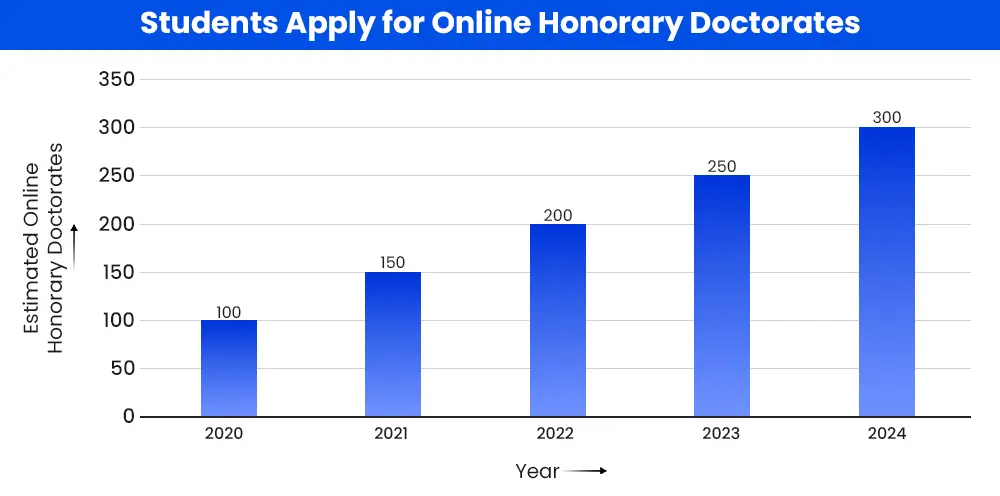Expert Interviews
- University Reviews
- Career Guide
 Video Counseling
Video CounselingImportant Facts
- Ask any Question - CV Forum

What Is an Honorary Doctorate Award Council & How It Works
Komal Jain Jul 21, 2025 1.2K Reads

In academia, the title Doctor is generally earned through decades of intense study, research, and educational accomplishment. But there are instances when people who might not have taken the conventional academic route but get the Dr title, because there are various universities that give symbolic awards to candidates who have been doing work in the same field for many years.
However, if you want to nominate yourself for the Honorary Doctorate, then it can be done as there are many foreign universities that are offering this program through an online medium. EIMT University is one of the top-ranked universities that offers.
, including the Chancellor or Vice-Chancellor, and other renowned members of the academic community. In a few instances, the council can also have alumni members or external specialists who are able to shed light on the achievements of the nominees. This entity is an advisory committee that guarantees that the selection procedure is severe, equitable, and based on the institution's values.
|
Aspect |
Description |
|
Definition |
A body or committee within a university or academic institution that evaluates and grants honorary doctorate degrees. |
|
Purpose |
To recognize individuals for outstanding contributions in fields such as science, arts, philanthropy, public service, or leadership. |
|
Type of Degree |
Honorary Doctorate not earned through traditional coursework. |
|
Composition of Council |
Usually includes university officials faculty members, and sometimes external experts. |
|
Nomination Process |
Public or internal nominations are submittedNominations include a detailed justification and supporting materials |
|
Review Procedure |
The council reviews qualifications and achievementsChecks for alignment with the institution’s values and mission |
|
Approval Authority |
Final decision often requires approval from the university’s senate, board of trustees, or president. |
|
Award Ceremony |
Typically presented during a convocation or commencement ceremony, often with a citation and speech by the recipient. |
|
No Academic Privileges |
Does not grant the right to teach, practice professionally, or use the title “Dr.” in an academic context (though recipients may use the title socially). |
|
Ethical Guidelines |
Institutions must ensure the award is not given in exchange for donations or favors, maintaining academic integrity. |
How Does the Honorary Doctorate Selection Procedure Work?
- Nomination: The process of bestowing an honorary doctorate generally begins with a nomination. The committee will establish the nominees who have provided service to the community in specific fields and have worked in that field for many years. People can be nominated by faculty, alumni, members of the university community, or even an external partner. In some cases, an award is given to those who have been nominated by approved institutions or organizations.
- Nomination Review: Once the nominations have been received, the honorary doctorate award council must assess the credentials and contributions of the nominees. The council will examine the nominee's accomplishments, not simply from an intellectual lens but also the extent of their contribution to society, creativity, leadership, and service to the advancement of their profession or community.
- Award Criteria: Although there can be institutional-specific criteria, there are general considerations that councils will use as a foundation to determine valid nominees. The university will select award candidates who meet all of the criteria. Here are a few key eligibility criteria:
- Excellence in a Field: Contributions of the candidate must be innovative or of great significance in their field, and also be specific contributions.
- Impact and Leadership: The candidate must show a significant positive contribution to society in humanitarian issues, scientific developments, cultural accomplishments, or other praiseworthy causes.
- Decision and Deliberation: The Honorary Doctorate Award Council deliberates, after considering all nominations, to determine the qualifications of nominees. This may happen after a vote was conducted. In other cases, the council may ask more questions or pursue details on a nominee's qualifications. If the nominee is acceptable to the council, he or she is recommended for the award.
- Official Recommendation to the University Board: Once a nominee is selected by the council, he or she is put forward to the university's board of governors or equivalent authority for final approval. In virtually all cases other than exceptional circumstances, the governors approve the nominee recommended by the council, although discussion may ensue.
- Awarding the Honorary Degree: When the award is ultimately approved, the honorary doctorate is presented at a ceremony, either as part of the university's graduation or on other special occasions; the recipient of the honorary doctorate is usually designs a diploma or certificate, and may be requested by the host university to address the audience to share personal experience and knowledge.
Types of Honorary Doctorates
Honorary doctorates will vary with the various aspects of the university's academic traditions and the nature of the recipient's achievements. Examples of the most commonly used titles for honorary degrees are:
- Doctor of Laws (LL.D.): Generally awarded to individuals who have made exceptional contributions in law, public service, or governance.
- Doctor of Letters (D.Litt.): Generally awarded to individuals who have made exceptional contributions to literature, the arts, and philosophy.
- Doctor of Science (D.Sc.): Generally awarded to a person who has made significant contributions in scientific investigations or technological invention.
- Doctor of Humane Letters (or Humanities) (L.H.D.): This award is presented to an individual who has demonstrated a significant contribution to an area of human services, education, or human sciences.
- Doctor of Divinity (D.D.): This honorary doctorates are generally presented to leaders possessing spiritual functions in a religious community.

Why Do Universities Offer online Honorary Doctorates?
The University offers an Honorary Doctorate to the candidate as they want to show respect for them and their work that impacts society in a positive way. Here are some examples of why universities offer this award:
-
Celebration of Excellence: With an Honorary document, universities seem to acknowledge the candidate who has contributed in a meaningful way, despite their contributions being outside the mainstream of academia.
- Building on the Reputation of the University: With all the publicity surrounding a distinguished candidate, a university can enhance its reputation, visibility, and prestige in the academy and beyond.
- Establishing Relationships: The award is a signature of good faith and provides the opportunity to further establish a stronger relationship between the university and an influential person, business community or other powerful entity.
- Motivating Students and Faculty: Honorary recipients are often role models, possessing qualities such as intellect, curiosity, volunteerism, and leadership. Honorary candidates will motivate students and faculty to be more excellent and create a better world.
Keep in Mind
An Honorary Doctorate Award Council is an essential part of the academic system to ensure a fair, rational, and consistent process for new honorary doctorate awards to new awardees. These councils honour exceptional individuals' contributions to the world in part or holistically, in fields including arts, sciences, business, or social change.
An award is not just a title, but an exceptional emblematization of the individual's commitment to one's vocation, one's community, and humankind. For the awardees of honorary degrees, it is an acknowledgment that their work is not only exceptional but also extraordinary beyond normal academic considerations. For universities, it is an opportunity to recognize and reinforce some of the areas of excellence, impact, and innovation that best distinguish their vision.
Students Apply for Online Honorary Doctorates
 How to Apply for an Honorary
How to Apply for an Honorary
Doctorate Degree Online?
Honorary doctorates are some of the most celebrated distinctions conferred by universities. They are usually given to individuals who have made significant impacts in fields such as education, philanthropy, science, visual arts, performance arts, business, humanitarianism, or social justice. Traditionally, honorary doctorates do not require coursework, exams, or dissertation acknowledgments of real-world impact.
Although you cannot "apply" for most honorary degrees in the normal sense (because they are offered to you), there are valid ways to nominate yourself or to be nominated, particularly via online media and alternative institutions.
-
Understanding an Honorary Doctorate honorary doctorate is representative. It will usually read as:
- Doctor of Humane Letters (DHL)
- Doctor of Laws (LLD)
- Doctor of Divinity (DD)
- Doctor of Science (DSc)
- Doctor of Arts (DA)
Typically, these degrees are given to an individual during a university ceremony, and the recipient is often a prominent public figure. Some institutions will offer honorary doctorates based on nominations and recognition via the internet or on a specific campus, specifically faith-based institutions, or private institutions.
-
Identify Legitimizing Institutions and Degree Structures
Not all honorary degrees are legitimate. Many online platforms and universities are diploma mills meaning they award degrees upon payment, without any academic value or evaluation.
To avoid scams:
- Research whether the institution is accredited, even if honorary degrees are not regulated; accreditation adds legitimacy.
- Look for institutions with a publicly listed board of directors, alumni, or previous honorees.
- Verify their charter or status as a degree-granting institution.
- Some religious or nonprofit universities offer honorary doctorates based on ministry, leadership, or humanitarian work, and have a genuine process in place.
-
Gather Your Achievements and Supporting Documentation
To be nominated or considered, you will typically need to submit:
- A professional biography or resume
- A statement of purpose or cover letter explaining your impact
- Documentation of your achievements, including awards, press mentions, testimonials, publications, etc.
- Letters of recommendation, and it might be sometimes optional.
These materials demonstrate the real-world contributions you’ve made and show that your work aligns with the values of the institution.
-
Submit an Application or Nomination Online
Some institutions have online nomination or application forms for honorary degrees. This process typically involves:
- Filling out a form on the university’s website
- Uploading your biography and achievements
- Paying an application or review fee (if applicable)
Keep in mind, legitimate universities do not sell honorary degreesbut a nominal fee may be required to process nominations or for ceremonial purposes.
-
Wait for Review and Approval
Once submitted, your materials are typically reviewed by a committee or board. This may take several weeks or months, depending on the institution.
If approved, you may receive:
- An official honorary doctorate certificate
- An invitation to a graduation ceremony
- Media or press coverage
-
Be Cautious of Red Flags
Avoid institutions that:
- Guarantee you a degree without reviewing your credentials.
- Ask for large payments up front.
- Do not have a physical address or contact details.
- Do not offer verification of the award.
- Honorary degrees should honor real contributions, not serve as vanity credentials.
-
Use Your Title Responsibly
Once awarded, you can use the title Dr. in contexts relevant to your honorary disciplinethough it is customary and respectful to clarify that it is honorary. It should not be used in place of an academic doctorate in scholarly or professional settings that require formal qualifications.

Final Thoughts
With a little effort and knowing where to look, you can obtain an honorary Doctorate online and legitimately. Honorary Doctorates can be conferred through either a religious organization, a nonprofit university, or a cultural organization. This award could be considered a recognition for a life of achievement and can also help you add credibility to your achievements.
FAQs (Frequently Asked Questions)
An Honorary Doctorate Award Council is a formal committee or body that considers individuals for honorary doctorate degrees in connection with extraordinary contributions to a field of study or practice, including the arts, sciences, education, philanthropy, or public service.
The council's role is to honor exceptional individuals who have made an undeniable impact on society, even if they are not formally educated ones, while also ensuring that the honorary degrees are awarded ethically based on credibility and merit.
Members of the council often include university officials, distinguished academics, public figures, and professionals with experience in education, leadership, or community service. They are selected for their expertise and impartiality.
The selection process typically involves:
- Nominations (public or internal)
- Review of achievements and credentials
- Background checks
- Voting by council members
- The final decision is based on the nominee’s contributions and alignment with the institution's values.
Nominees are evaluated based on:
- Impact of their work on society
- Contributions to their field or community
- Ethical standing and public reputation
- Alignment with the mission of the awarding institution
Yes, generally anyone can be nominated, but not everyone will be approved. The council focuses on individuals with notable accomplishments, often at a national or international level.
No-accredited honorary doctorates are conferred with no fee.
Common honorary degrees include:
- Doctor of Humane Letters (DHL or LHD)
- Doctor of Laws (LLD)
- Doctor of Science (DSc or ScD)
- Doctor of Divinity (DD)
No, an honorary doctorate is a symbolic title, not an indication of actual academic coursework or research. It does not convey the same rights or standing as an earned doctorate.
Credibility is established and maintained by:
- Transparent nomination and review processes,
- Ethical selection standards,
- The members of the council should hold reputable and verifiable information.

By Komal Jain
5 Years of Experience / Storyteller / Research-driven Writer
Passionate about digital marketing with a creative flair for content creation.Experienced Always eager to learn, grow, and make a meaningful impact in the digital space.
Every query is essential.
Our team of experts, or experienced individuals, will answer it within 24 hours.
Recommended for you
Tired of dealing with call centers!
Get a professional advisor for Career!
LIFETIME FREE
Rs.1499(Exclusive offer for today)

Pooja
MBA 7 yrs exp

Sarthak
M.Com 4 yrs exp

Kapil Gupta
MCA 5 yrs exp
or



Career Finder
(Career Suitability Test)
Explore and Find out your Most Suitable Career Path. Get Started with our Career Finder Tool Now!
ROI Calculator
Find out the expected salary, costs, and ROI of your chosen online university with our free calculator.
